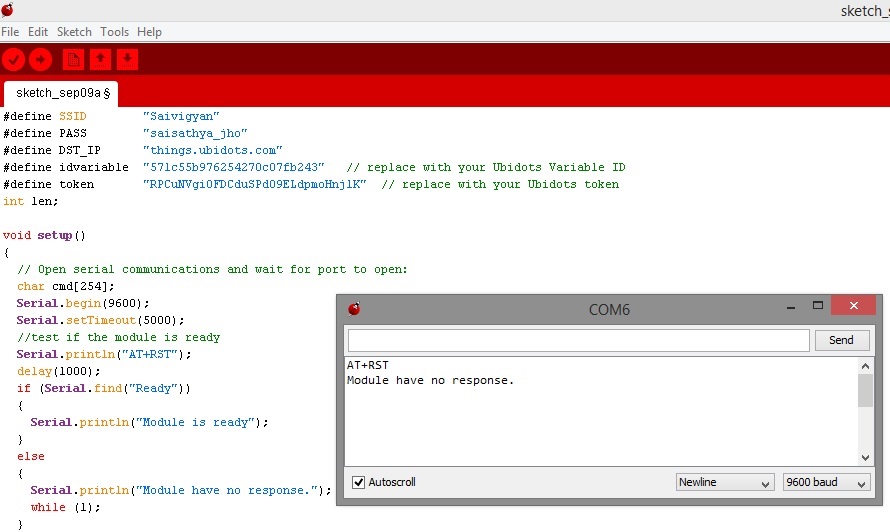Hello
I am trying to send data to browser using wifi module ESP8266 with MSP430G2553 launchpad.
ESP8266 work on 3.3V and MSP430G2553 also. So here i connected ESP8266 directly to the launchpad.
connections are-
Tx of ESP to Rx of Launchpad
Rx of ESP to Tx of Launchpad
VCC to Vcc
Gnd to Gnd
CH_PD to 3.3V
and i got working code for energia from internet. code is as follows
#define SSID "friends"
#define PASS "walchand"
#define DST_IP "things.ubidots.com"
#define idvariable "569fc4ba76254229c49896a6" // replace with your Ubidots Variable ID
#define token "aIdUatYb4QqgntExGmdi6xIllonUaY3AxwJjs5UzCCVib9reI1dI2XFEnfeX" // replace with your Ubidots token
int len;
void setup()
{
// Open serial communications and wait for port to open:
char cmd[254];
Serial.begin(9600);
Serial.setTimeout(5000);
//test if the module is ready
Serial.println("AT+RST");
delay(1000);
if (Serial.find("ready"))
{
Serial.println("Module is ready");
}
else
{
Serial.println("Module have no response.");
while (1);
}
delay (1000);
//connect to the wifi
boolean connected = false;
for (int i = 0; i < 5; i++)
{
if (connectWiFi())
{
connected = true;
break;
}
}
if (!connected) {
while (1);
}
delay(5000);
Serial.println("AT+CIPMUX=0");
}
void loop()
{
int value = analogRead(A0); //you can change ir to another pin
int num=0;
String var = "{\"value\":"+ String(value) + "}";
num = var.length();
String cmd = "AT+CIPSTART=\"TCP\",\"";
cmd += DST_IP;
cmd += "\",80";
Serial.println(cmd);
if (Serial.find("Error")) return;
len=strlen ("POST /api/v1.6/datasources/");
len=len+strlen (idvariable);
len=len+strlen ("/values HTTP/1.1\nContent-Type: application/json\nContent-Length: ");
char numlenght[4]; // this will hold the length of num which is the length of the JSON element
sprintf(numlenght, "%d", num); // saw this clever code off the net; works yay
len=len+strlen (numlenght);
len=len + num; //fixed length of the string that will print as Content-Length: in the POST
len=len+strlen ("\nX-Auth-Token: ");
len=len+strlen (token);
len=len+strlen ("\nHost: things.ubidots.com\n\n");
len=len+strlen ("\n\n");
Serial.print("AT+CIPSEND=");
Serial.println (len); //lenght of the entire data POST for the CIPSEND command of ESP2866
//Serial.println(cmd.length());
if (Serial.find(">"))
{
//Serial.print(">");
} else
{
Serial.println("AT+CIPCLOSE");
delay(1000);
return;
}
Serial.print ("POST /api/v1.6/variables/");
Serial.print (idvariable);
Serial.print ("/values HTTP/1.1\nContent-Type: application/json\nContent-Length: ");
Serial.print (num);
Serial.print ("\nX-Auth-Token: ");
Serial.print (token);
Serial.print ("\nHost: things.ubidots.com\n\n");
Serial.print (var);
Serial.println ("\n\n");
delay(9000);
//Serial.find("+IPD"); clear the input buffer after the web site responds to the POST
while (Serial.available())
{
char c = Serial.read();
}
delay(1000);
}
boolean connectWiFi()
{
Serial.println("AT+CWMODE=1");
String cmd = "AT+CWJAP=\"";
cmd += SSID;
cmd += "\",\"";
cmd += PASS;
cmd += "\"";
Serial.println(cmd);
delay(2000);
if (Serial.find("OK"))
{
return true;
} else
{
return false;
}
}
when i trying to connect to wifi then it is not working properly Only red LED is glowing but not Blue.
output giving..
AT+RST
Module have no response.
So what can be the problem??
Is there issue of power supply?? because esp require more current than msp provide. But on internet anywhere i didn't about this issue.
I got code from below link


